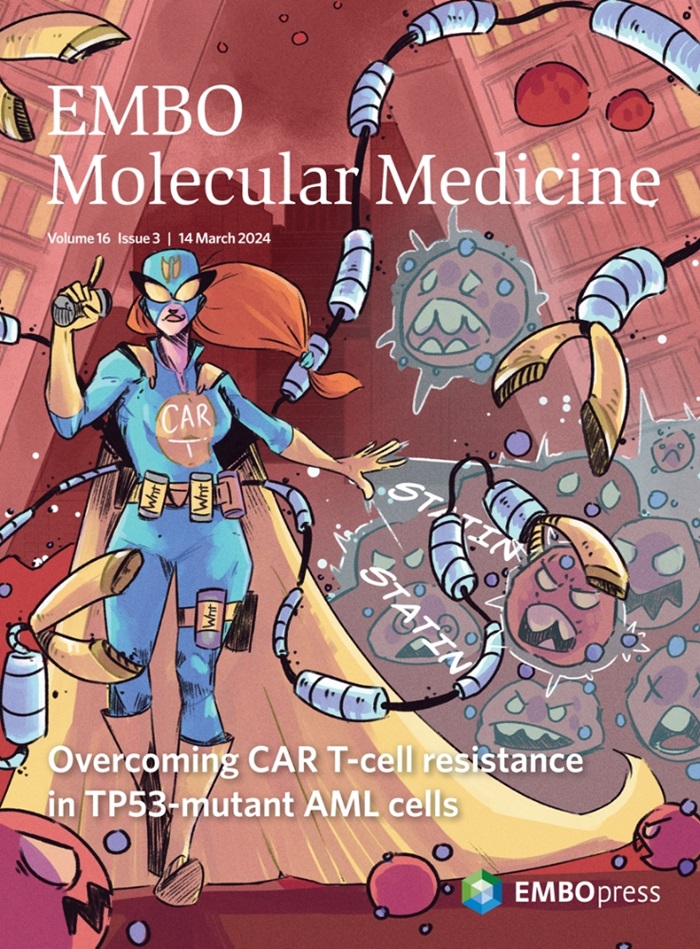近端小管细胞中p300的缺失可减少肾纤维化和内皮-间质转化。
IF 8.3
1区 医学
Q1 MEDICINE, RESEARCH & EXPERIMENTAL
引用次数: 0
摘要
慢性肾脏疾病(CKD)在世界范围内具有很高的患病率,通常伴有严重的纤维化。然而,肾纤维化的确切发病机制和有效的治疗方法尚未确定。在本研究中,我们发现组蛋白乙酰转移酶p300在局灶节段性肾小球硬化患者和几种不同的肾纤维化小鼠模型中表达增加。此外,我们发现akt介导的p300 Ser-1834磷酸化增加了p300在肾纤维化诱导时的稳定性,相反,PPM1K特异性地使p300 Ser-1834去磷酸化,导致p300稳定性和肾纤维化显著降低。有趣的是,近端小管细胞(ptc)中p300的增加通过上调与间质转化相关的分泌蛋白POSTN、FSTL1和FSCN1介导内皮细胞向间质转化(EndMT),从而促进肾纤维化的发展。ptc特异性缺失p300基因或p300选择性抑制剂均可显著减少EndMT和肾纤维化。总之,我们的研究结果证明了p300在肾纤维化发展中的作用,并表明p300是治疗晚期CKD的一个有希望的靶点。本文章由计算机程序翻译,如有差异,请以英文原文为准。
Loss of p300 in proximal tubular cells reduces renal fibrosis and endothelial-mesenchymal transition.
Chronic kidney disease (CKD) has a high prevalence worldwide and is typically accompanied by severe fibrosis. However, the exact pathogenesis of renal fibrosis and effective treatments have yet to be identified. In this study, we found that expression of the histone-acetyltransferase p300 was increased in focal segmental glomerulosclerosis patients and several distinct mouse models of renal fibrosis. Moreover, we showed that the AKT-mediated phosphorylation of Ser-1834 of p300 increased the stability of p300 upon renal fibrosis induction, and conversely, PPM1K specifically dephosphorylated p300 at Ser-1834, resulting in a significant reduction in p300 stability and renal fibrosis. Interestingly, increased p300 in proximal tubular cells (PTCs) promoted renal fibrosis development by mediating the endothelial to mesenchymal transition (EndMT) via upregulation of the mesenchymal-transition-related secreted proteins POSTN, FSTL1, and FSCN1. Both EndMT and renal fibrosis were significantly diminished by either PTC-specific deletion of p300 gene or selective inhibitors of p300. Collectively, our results demonstrate the role of p300 in the development of renal fibrosis, and suggest that p300 is a promising target for treatment of advanced CKD.
求助全文
通过发布文献求助,成功后即可免费获取论文全文。
去求助
来源期刊

EMBO Molecular Medicine
医学-医学:研究与实验
CiteScore
17.70
自引率
0.90%
发文量
105
审稿时长
4-8 weeks
期刊介绍:
EMBO Molecular Medicine is an open access journal in the field of experimental medicine, dedicated to science at the interface between clinical research and basic life sciences. In addition to human data, we welcome original studies performed in cells and/or animals provided they demonstrate human disease relevance.
To enhance and better specify our commitment to precision medicine, we have expanded the scope of EMM and call for contributions in the following fields:
Environmental health and medicine, in particular studies in the field of environmental medicine in its functional and mechanistic aspects (exposome studies, toxicology, biomarkers, modeling, and intervention).
Clinical studies and case reports - Human clinical studies providing decisive clues how to control a given disease (epidemiological, pathophysiological, therapeutic, and vaccine studies). Case reports supporting hypothesis-driven research on the disease.
Biomedical technologies - Studies that present innovative materials, tools, devices, and technologies with direct translational potential and applicability (imaging technologies, drug delivery systems, tissue engineering, and AI)
 求助内容:
求助内容: 应助结果提醒方式:
应助结果提醒方式:


